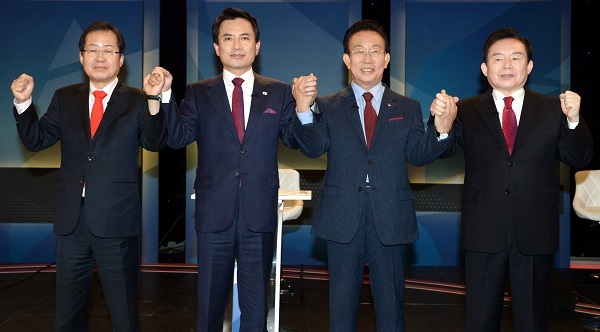As the race for the presidency of South Korea begins to get some clarity, with each political camp proceeding with their respective primary race, speculation is growing for a possible two-party or even three-party coalition to compete against the Democratic Party of Korea.
In the main conservative Liberty Korea Party’s race, clear front-runner Hong Joon-pyo is flirting with the possibility of an alliance with the Bareun Party, which broke away from it late last year, saying the two parties “have not divorced, but separated (for the time being).”
In the main conservative Liberty Korea Party’s race, clear front-runner Hong Joon-pyo is flirting with the possibility of an alliance with the Bareun Party, which broke away from it late last year, saying the two parties “have not divorced, but separated (for the time being).”

The outspoken South Gyeongsang Province governor has emerged as the Liberty Korea Party’s best shot at winning the May 9 presidential election, but his support has yet to surpass 10 percent of the electorate.
Aspirants of the Bareun Party are posting even poorer ratings, as they have failed to offer voters a differentiated appeal from the Liberty Korea Party, the home party of ousted President Park Geun-hye.
Bareun is to finalize its presidential candidate Tuesday, while the Liberty Korea Party will choose their flagbearer on Friday.
As the Bareun Party’s leading hopeful Yoo Seong-min has expressed his willingness for solidarity with a candidate from the Liberty Korea Party, the possibility is growing for the conservative coalition.
A political analyst on TV predicted that “the Bareun Party will possibly face an existential crisis after the presidential election if it sticks to its current stance.” He raised the possibility the Bareun Party will do more to seek a collaboration by mid-April.
Some political watchers say conservatives in general might ultimately choose to take on a kingmaker role, giving up on the goal of extending conservative rule by another five years after President Park was expelled from power.
Their method of hampering a liberal presidency could be to pave the way for a centrist candidate like Ahn Cheol-soo of the People’s Party to take on a Democratic Party of Korea candidate, most likely Moon Jae-in.
More and more, watchers share the view that the two conservative parties will have no choice but to collaborate in any way they can.
After fostering the tripartite competition involving candidates from the Democratic Party of Korea and People’s Party, they could closely monitor polls for one or two weeks.
Should the united conservative candidate be ranked third, he could continue to focus on highlighting allegations of a liberal contender as a strategic negative.
After making verbal attacks, the conservative aspirant may drop his presidency bid at the final stage of the campaign -- in late April or early May.
The scenario could bring the effect that a majority of voters in the Daegu and North Gyeongsang Province region and Seoul’s Seocho and Gangnam districts will cast ballots for a centrist. In addition, Ahn of the People’s Party has confirmed strong support from the Jeolla provinces.
The scenario also enables Ahn to garner right-wing support without entering a formal alliance with conservatives, who he has said should be held accountable for the presidential scandal.
Ahn’s coming position is also likely to gain attention, as his support still lags far behind liberals Moon and An Hee-jung, despite his rising popularity in the southwest.
By Kim Yon-se (kys@heraldcorp.com)



![[Exclusive] Korean military set to ban iPhones over 'security' concerns](http://res.heraldm.com/phpwas/restmb_idxmake.php?idx=644&simg=/content/image/2024/04/23/20240423050599_0.jpg&u=20240423183955)




![[Herald Interview] 'Amid aging population, Korea to invite more young professionals from overseas'](http://res.heraldm.com/phpwas/restmb_idxmake.php?idx=644&simg=/content/image/2024/04/24/20240424050844_0.jpg&u=20240424200058)
![[Pressure points] Leggings in public: Fashion statement or social faux pas?](http://res.heraldm.com/phpwas/restmb_idxmake.php?idx=644&simg=/content/image/2024/04/23/20240423050669_0.jpg&u=)









